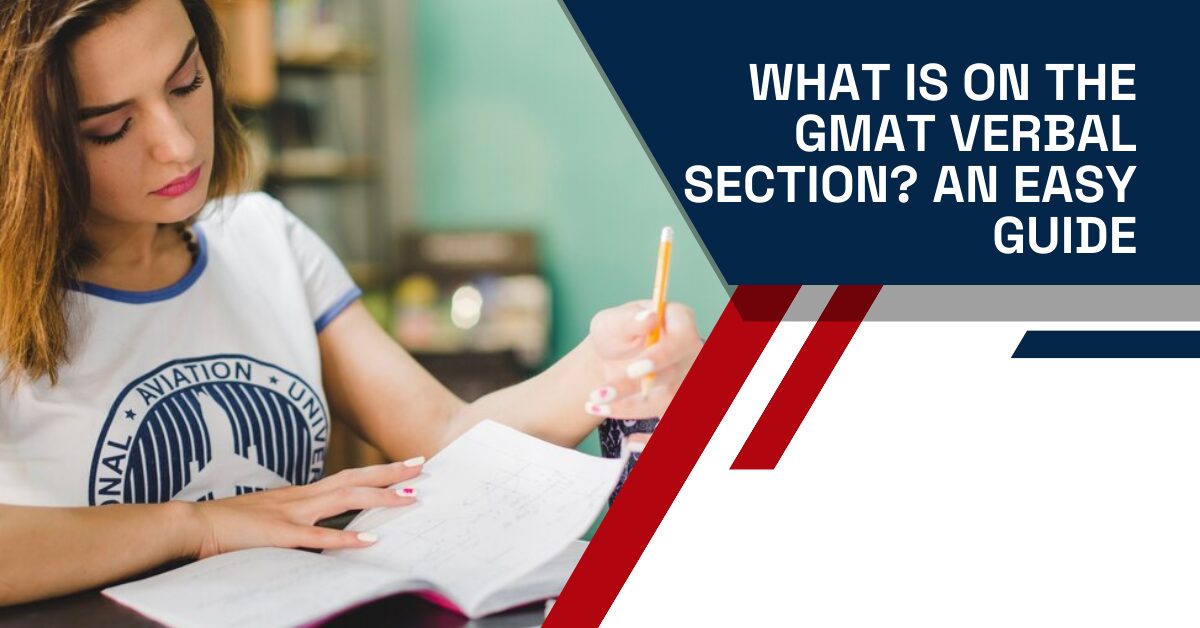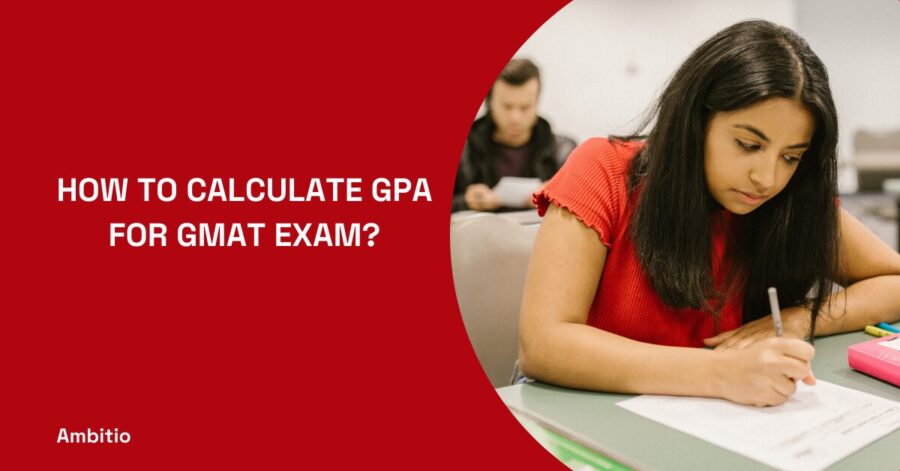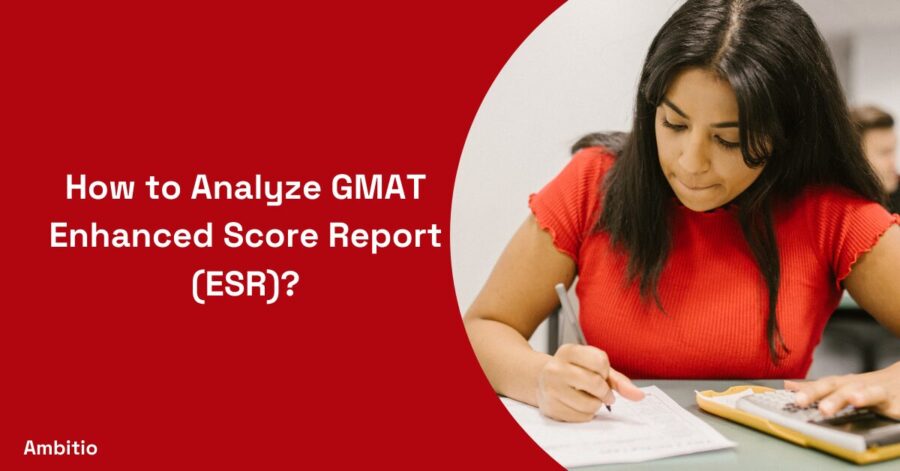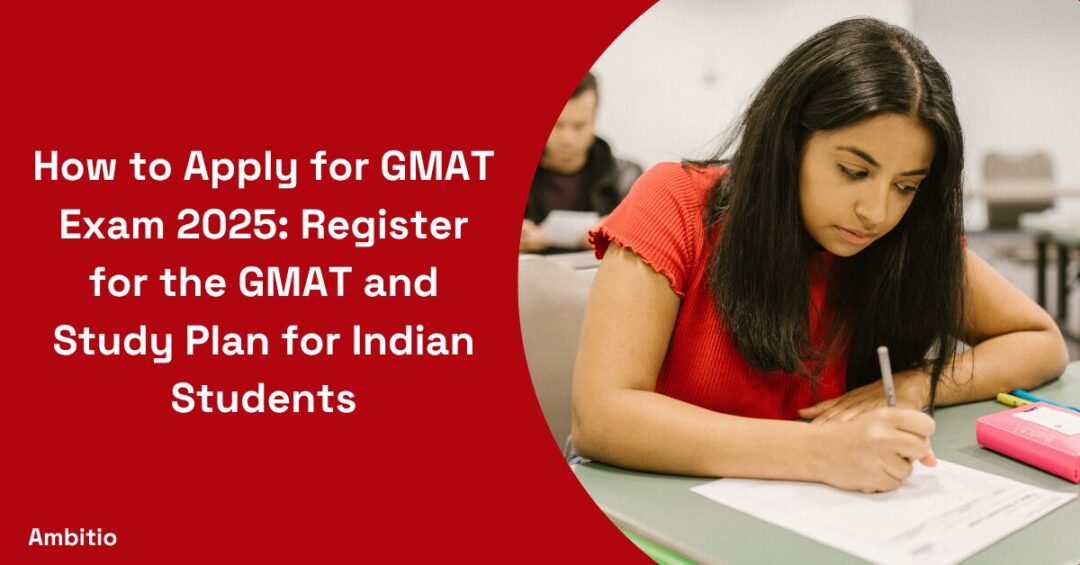4 September 2024
5 minutes read
What Is On The GMAT Verbal Section? An Easy Guide

Key Takeaways
- Excelling in the GMAT verbal section boosts your overall score and MBA prospects.
- Practice consistently and understand argument structures, grammar rules, and reading passages.
- Use active reading, logical analysis, and elimination techniques to tackle challenging questions.
Did you know that mastering the GMAT verbal section can significantly boost your overall GMAT score, potentially placing you in a higher GMAT percentile and increasing your chances of getting into a top MBA University in USA? Many test-takers find the verbal section challenging due to its focus on critical reasoning, reading comprehension, and sentence correction. These types of questions require not just good English skills but also the ability to evaluate arguments and understand complex passages.
However, the struggles with the GMAT verbal section are real. The pressure of adaptive testing can be daunting. Students often get stuck on tricky critical reasoning questions or confused by complex reading comprehension passages. But with the right test GMAT prep strategies and a thorough understanding of the types of questions, you can tackle the GMAT verbal section more effectively and achieve 740 in the GMAT exam.
This guide will help you understand the verbal section of the GMAT exam better and provides tips to score even better.
GMAT Exam Verbal Section: Reading Comprehension Questions
In the verbal section of the GMAT, reading comprehension questions are designed to test your ability to read and understand passages on various topics, ranging from social science to business. You’ll encounter these GMAT verbal questions as part of the 36 questions to be completed in the GMAT verbal section. This section tests your ability to read and comprehend complex texts, infer meanings, and understand the passage’s key points.

- Types of Questions: This section includes questions that test your ability to read, understand, and infer information from passages.
- Difficulty Level: The questions range in difficulty and involve multiple-choice answers, requiring careful reading and reasoning.
- Time Management: You’ll need to manage your time effectively, as you have 65 minutes to complete the entire verbal section of the GMAT focus edition.
- Key Skills: Focus on improving your ability to read and comprehend, making inferences, and solidifying your reasoning skills.
GMAT Exam Verbal Section: Critical Reasoning Questions
Critical reasoning questions in the GMAT verbal section assess your ability to evaluate arguments, identify assumptions, and make logical inferences. This section challenges your reasoning skills, requiring you to analyze and strengthen or weaken arguments presented in short passages.
- Types of Questions: These questions test your ability to evaluate, strengthen, or weaken arguments, and identify assumptions.
- Difficulty Level: Questions vary in complexity and often include tricky wording that requires careful analysis.
- Time Management: Allocate about 2 minutes per critical reasoning question. Read the question stem first to understand what is being asked, then carefully read the argument to identify key points before evaluating the answer choices.
- Key Skills: Focus on developing strong reasoning skills, the ability to analyze arguments, and formulate logical conclusions.
GMAT Exam Verbal Section: Sentence Correction Questions
Sentence correction questions in the GMAT verbal section assess your proficiency in grammar, clarity, and effective communication. This section tests your ability to identify and correct errors in sentence structure and usage, crucial for achieving a high verbal score.
- Types of Questions: These questions present a sentence with an underlined portion that may contain errors in grammar, usage, or structure. You must choose the correct answer that best improves the sentence.
- Difficulty Level: Questions range in complexity, requiring a strong understanding of English grammar rules and the ability to recognize subtle errors.
- Time Management: Allocate about 1 minute and 15 seconds per sentence correction question. Quickly identify the error and evaluate each answer choice to find the best correction.
- Key Skills: Focus on mastering grammar rules, understanding proper sentence structure, and improving clarity and conciseness.
6 Expert Tips To Perform Better In GMAT Verbal Section
Did you know that achieving a 700+ score on the GMAT puts you in the top 10% of test-takers worldwide? Achieving maximum GMAT score requires a strategic approach and consistent practice. Here are six expert tips to help you excel in the GMAT verbal section.

Understand the Question Types
Familiarize yourself with the different question types—reading comprehension, critical reasoning, and sentence correction. Knowing what to expect will help you develop targeted strategies for each type and solidify your verbal skills. The verbal section involves making inferences, understanding passages, and selecting the correct answer from multiple-choice options. A good GMAT score can open doors to prestigious business schools, so invest the time and effort needed to excel. Your dedication will pay off, placing you in a higher percentile and bringing you closer to your dreams if you want to study MBA.
Practice Active Reading
Improve your reading and reasoning skills by practicing active reading. Read the passage thoroughly, summarize it in your own words, and note key details. This will enhance your ability to read and comprehend complex texts, which is essential for answering questions accurately and efficiently.
Analyze Logical Patterns
For critical reasoning questions, focus on understanding the structure of arguments. Practice identifying assumptions, drawing inferences, and evaluating the strength of arguments. This will sharpen your reasoning skills and improve your ability to formulate logical conclusions, a key skill for the verbal section.
Master Grammar Rules
Build a solid foundation in English grammar for sentence correction questions. Study common grammatical errors, such as subject-verb agreement and parallelism, to quickly spot and correct mistakes. This will improve your proficiency and help you tackle the tricky wording often found in these questions.
Use Process of Elimination
Employ the process of elimination to narrow down answer choices. Eliminate clearly incorrect options to increase your chances of selecting the correct answer, especially when you’re unsure. This strategy is particularly useful given the difficulty level of some questions.
Conclusion
At last, mastering the GMAT verbal section is a crucial step towards achieving a high overall score and increasing your chances of getting into top MBA programs. Understanding the types of questions—reading comprehension, critical reasoning, and sentence correction—is key to developing effective strategies. By practicing active reading, analyzing logical patterns, mastering grammar rules, and employing the process of elimination, you can, of course, enhance your verbal skills.
Remember, the verbal section of the GMAT involves making inferences, understanding passages, and selecting the correct answer from multiple-choice options. Consistent practice and strategic preparation will boost your confidence and proficiency, allowing you to tackle even the trickiest questions.
Maximize your GMAT potential and aim for the top with Ambitio’s comprehensive prep tools. Our approach focuses on enhancing your strengths and addressing your weaknesses, providing you with the skills and confidence needed to score higher and reach your MBA goals.
FAQs
How Do I Register for the GMAT?
How Much Does the GMAT Cost?
How Often Can I Take the GMAT?
Can I Reschedule a GMAT Appointment?
How Should I Prepare for the GMAT?
Where Can I Find Prep Material for the GMAT?
How Long Should I Study for the GMAT?
The amount of time needed depends on your starting skill level, target score, and circumstances. However, most experts recommend at least 2-3 months of dedicated prep time.

You can study at top universities worldwide!
Get expert tips and tricks to get into top universities with a free expert session.
Book Your Free 30-Minute Session Now! Book a call now




























